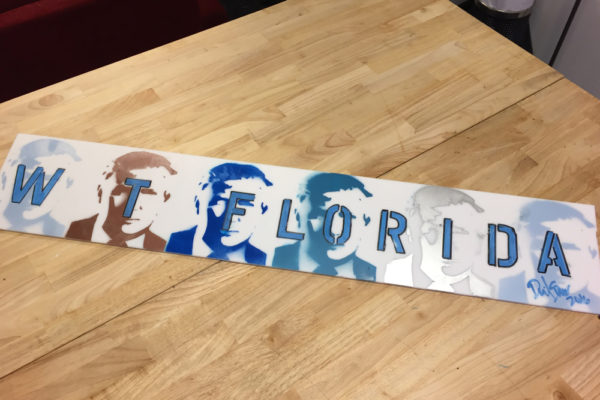Teaching
Teaching in the age of coronavirus
As of March 12, FIU, along with most other universities in the country, put all of its classes online. This week, the Board of Governors said that all classes within Florida’s state system should avoid face-to-face classwork for the rest of the spring and prep for possibly taking at the summer session online-only as well.
And, oh yeah, they cancelled graduation ceremonies.
It’s left me and my colleagues reeling. Shortly after the announcement, my department said it was also going to strongly discourage students from covering events or doing any in-person interviews. Though the students themselves are unlikely to get extremely sick, they could easily pass it along to a more vulnerable relative.
Though smart, it is particularly hard for the broadcast folks, since it’s more than a little difficult to conduct a video interview by phone. I’m guessing it’s possible, somehow, but it’s not a technology the students or professors normally use – and trying to get them to learn new methods while they’re trying to figure out how to even finish out their courses seems almost cruel. But even then, how would b-roll work?
It’s significantly easier for students assigned text-based work. Most print reporters I know do almost all of their work by phone and email anyhow. The production pressures of the job make it hard to take the time to get out of the office. But since we have more time in a college setting, I encourage face-to-fact work, since those interviews are often more substantive. In addition, they build trust between the reporter and source, leading to a long and productive relationship rather than a one-off.
Election Day implications
Adding to the challenges, Tuesday was Election Day in Florida. My original plan involved sending about a dozen students out – in two shifts – to the polls to ask folks who they voted for and why. They would write up these three-to-four paragraph stories quickly and send them to the desk – made up of myself and some of the more advanced students – who would edit the pieces and post them online.
At the end of the night, another group of students and another professor would take that feed and rewrite it into a more traditional story. Everyone gets the thrill of writing on deadline and, of course, the traditional Election Day newsroom pizza. (I believe that’s a law somewhere.)
But, no, that didn’t happen. Unable to actually go to the polls, how would they reach these voters? I came up with a plan: I had a copy of the latest voter registration data from the Florida Division of Elections office. A surprising number of people add in their emails or phone numbers when they register – meaning we had about 100,000 potential numbers to call in Miami-Dade alone.
Though less than ideal, I divvied up the list to make sure we didn’t call anyone more than once – cold calling being annoying even with the best of intentions – and told my students to start working the phones. Because the prohibition against in-person work extended to professors as well, the desk idea just couldn’t work, so the pieces were edited by myself and a couple of colleagues. I think we did a pretty good job, all considered.

Grading and the pass/fail petition
But after this, a new question. How in the hell do I appropriately grade this? Under normal circumstances, I have a pretty detailed rubric detailing points (or deductions) for completeness and quality. How much slack should students be given in these trying days and circumstances? It’s a hard one, in part because each student’s situation is likely to be very different.
Some may have more free time than ever before, meaning a decision to turn in sloppy or incomplete work a function of laziness or lack of ambition. Others may have had their lives turned upside down – having to care for a sick relative or suddenly being jobless – that makes pushes college work, appropriately, far down the priority list.
At present there are two competing Change.org petitions at FIU: one requesting that the university make all courses pass/fail (or at least provide that as an option) and one requesting that everything remain the same. The pass/fail petition says that due to the – often radical – changes to the courses to enable online learning, the emptying of student housing, the stresses of family concerns and job loss, the only fair thing is to make all Spring 2020 courses ungraded. As of Friday morning, it has more than 17,000 signatures.
The counter-petition – with about a tenth the number of signers – notes that students trying to get into graduate school NEED those letter grades, and given that the school was two-thirds of the way through the semester when this happened, everything should stay as it is. There’s been no decision from the university about this – though its coronavirus page notes they’re considering what to do – and no announcement about what will happen to graduation.
After some consideration, I like the idea that students can request the course be pass/fail, though they may receive a letter grade if they wish. This allows me to be consistent in my expectations and grading, but provides a safety valve for students facing extreme difficulties.
In a way, something similar happened to me. My mom died from cancer within days of my graduation from UC Berkeley. My grades in my last semesters were, to be blunt, not great. When I applied to graduate school about five years later, the admissions director at Columbia University called me to ask if I could explain what happened.
I explained, honestly, that my mom was dying and I simply was too distracted to care much about my senior seminars on modern literature. He thanked me for telling him and three days later I had a FedEx letter informing me I had been accepted.
Even if FIU declines to give a pass/fail option for this semester, I do not think it will impact students’ futures in any negative way. Good graduate programs will understand a downtick in grades this semester. But I believe giving the option will go a long way toward reducing student anxiety, an intrinsic good given the current state of the world.
Get updates about upcoming shows and published work
I won’t sell your info. That’s just rude.




